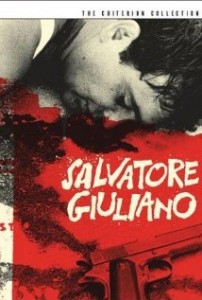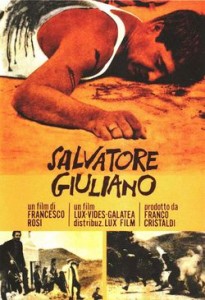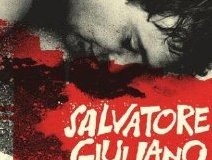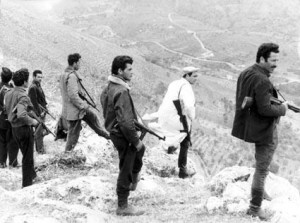Salvatore Giuliano ***** (1961, Salvo Randone, Frank Wolff) – Classic Movie Review 1705
Co-writer/director Francesco Rosi’s astonishing, eye-opening 1961 Italian classic provides a dark and complex portrait of Sicilian politics after World War Two, centring round its starting point in 1950 when the famous Sicilian 28-year-old guerrilla leader and outlaw Salvatore Giuliano is found gunned down in a Sicilian courtyard.
Placing Giuliano mostly off screen apart from appearing as a corpse, the film focuses instead on the lives of those involved with him. It is shot in a startling and provocative neo-realist documentary, non-linear style.
The film moves back and forth between the late 1940s, when Giuliano and others are recruited by Sicilian separatist politicians to do their fighting, and the days leading up to and after Giuliano’s death. After the war, Giuliano is one of the freedom fighters who take to the hills with rifles and whose guerrilla tactics lead to Sicily’s self-rule being declared. It is promised that the outlaws will be pardoned but unfortunately promises aren’t always kept.
The sudden jumps in timeline and the intricacies of Sicilian politics make full understanding of what’s going on tricky for non-Sicilians. Even Italians and younger Sicilian audiences probably don’t know all this history. Will they even have heard of Salvatore Giuliano? Hard to imagine any Brits or Americans knowing who he was.
With so much new information flying at you, the movie makes you feel like a slow student some of the time. But still, this will help to clue us all in, as vital issues are tackled in an excitingly immediate, neo-realist way. It’s the kind of film they really don’t make any more. It’s an in-your-face dramatic movie, full of vibrant characters and thrillingly shot images, yet it is essentially issue-led and about something.
Rosi’s handling of the May Day massacre, when Giuliano orders his gang to fire on a peaceful rally, and the rowdy drama of the extended trial scenes after his death has direct and startling immediacy. The film often really grabs you by the throat, even if it bewilders you at other times with details of lives and stories and issues long gone.
Amateurs effectively mix with professional actors for the sake of realism and in pursuit of a documentary style of film-making. The performances are convincing, whether the actors are professional or not. Salvo Randone stars as the President of Viterbo Assize Court, with Frank Wolff as the accused Gaspare Pisciotta, and most of the rest of the cast are non-professional locals. Francesco Rosi narrates the film. He won the Silver Bear for Best Director at Berlin in 1962.
The film is rereleased in UK cinemas in September 2014 in a magnificent 4K digital restoration that eradicates all it blemishes and physical shortcomings.
The original English language title of The Dreaded Mafia is hilariously ridiculous, and totally overstates any part the film shows the Mafia has in the story.
Francesco Rosi, renowned for his investigative movies, including 1972 Palme d’Or winner The Mattei Affair, and for his films depictiing corruption in Italy, died on 10 January 2015 at his home in Rome, aged 92.
© Derek Winnert 2014 Classic Movie Review 1705
Check out more reviews on http://derekwinnert.com/







